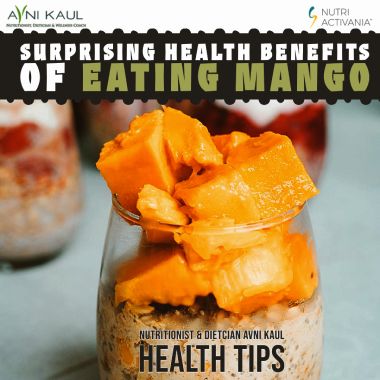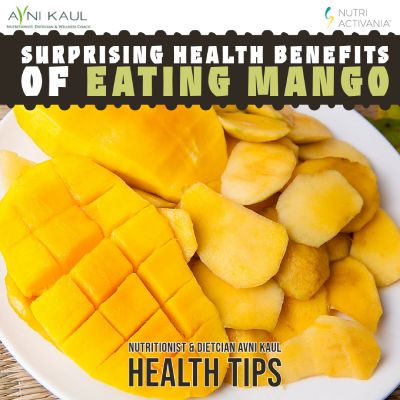
We all have our favourite foods. When it comes to fruits, mango is the absolute favourite. This fruit is loved for its delicious taste, bright colour, and smooth texture. But what makes mangoes special is the experience they give you. When you bite into a ripe mango, it is not just about the taste; it is like going on a journey with your senses. The juicy fruit drips down your chin, its sweet smell fills the air, and the soft flesh delights your tongue—it is a moment of pure happiness. Originally from Southern Asia, these tropical fruits come in different colours like yellow, green, or red-green. Nowadays, mangoes are grown in many parts of India. But, did you know that your favourite fruit is not only delicious but also healthy? Avni Kaul, an eminent dietitian in India, shares the nutritional benefits of mango in this article.

Rich in nutrients – Mangoes are packed with essential nutrients like vitamins K, C, A, and E, along with folate, providing various health benefits. Vitamin K aids in blood clotting and prevents anaemia, while vitamin C supports blood vessel formation, collagen production, and immune system strength. Vitamins A and E enhance immunity by promoting white blood cell production. Just a 1/4 cup of mango can fulfil 50% of your daily vitamin C needs and 8% of vitamin A and B6 requirements.
Aids digestion – Mangoes, rich in both soluble and insoluble fibre, aid in digestion by adding bulk to stool, making it softer and easier to pass, thus alleviating constipation and bloating. The presence of polyphenols, such as gallo-tannins in mangoes, enhances digestive well-being by offering anti-inflammatory and antioxidant benefits, which can alleviate conditions like ulcerative colitis. In fact, mango leaves contain compounds with potential antidiarrheal properties, contributing to improved digestion.
Helps in weight management – Eating mangoes can help you feel full for longer, making it easier to stick to healthy eating. They take longer to digest than processed snacks like chips or crackers, so you are less likely to feel hungry soon after. This means you can avoid snacking on high-calorie foods. Plus, mangoes provide extra nutrients to support your weight loss goals.
Good for your skin and hair – To keep your skin healthy, it is important to get vitamins A, C, and E from whole foods like mangoes instead of from supplements, which can be harmful and may not be absorbed as well by the body. These vitamins act as antioxidants, helping to protect your skin from damage caused by the environment. Mangoes are a great source of these nutrients, with vitamin A boosting collagen production and reducing fine lines, while vitamin C helps to prevent premature ageing and protects against UV rays. Moreover, mango peel contains antioxidants that are good for your skin too. So, eating mangoes can help improve your skin health naturally.
Takes care of your heart health – Mangoes are good for your heart health because they contain magnesium and potassium, which help to lower blood pressure and keep your heartbeat regular. They also have a compound called mangiferin, which might reduce inflammation in the heart, according to studies on animals. But, we need more research to know if these benefits apply to humans too.
Good for your eyes – Carotenoids like lutein and zeaxanthin present in mangoes help keep our eyes healthy. They protect the retina from sunlight and blue light from screens. These carotenoids are especially good at preventing age-related macular degeneration, which can cause vision problems as we get older. So, eating mangoes can help keep our eyesight sharp and clear for longer.
Therefore, it is evident that including mangoes in your diet can offer a multitude of health benefits, from boosting immunity and aiding digestion to promoting heart and skin health, making them a delicious and nutritious addition to your daily meals.
Avni Kaul is Founder of Nutriactivania with Masters Degree in Food and Nutrition from University of Delhi and is also a Certified Diabetes Educator from Project Hope and International Diabetes Federation. She is a Leicester Mammas Ambassador trained in Lactation Counselling with NHS United Kingdom. Mammas support pregnant and new mothers and their families. Specializations of Avni Kaul Include Infant and Young Child Feeding Practises, Pre and Post natal diets, Fat loss, Muscle Gain and Holistic Health and Nutrition